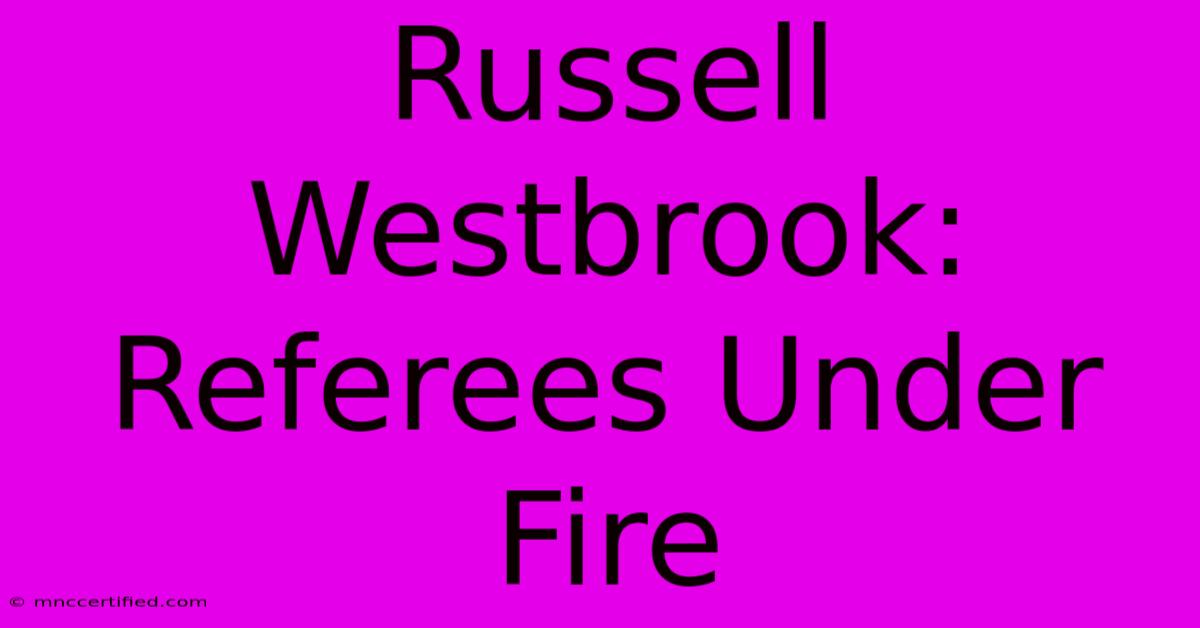Russell Westbrook: Referees Under Fire

Table of Contents
Russell Westbrook: Referees Under Fire
Russell Westbrook, a name synonymous with explosive athleticism and unwavering intensity on the basketball court, has also become increasingly associated with contentious relationships with referees. This article delves into the recurring criticisms leveled against officials regarding their calls involving Westbrook, exploring the nuances of the situation and examining both sides of the argument. We'll analyze specific instances, consider potential biases, and discuss the impact these controversies have on the game and Westbrook's legacy.
The Nature of the Complaints
The complaints against referees officiating Westbrook's games often center on perceived inconsistencies in calls. Critics argue that Westbrook, known for his aggressive playing style and emotional outbursts, is unfairly targeted by referees, resulting in a disproportionate number of fouls and technical fouls compared to other players with similar playing styles. This perceived bias fuels the narrative of Westbrook being unfairly penalized, impacting his team's performance and his own statistical output. The argument goes beyond individual calls; it points to a pattern of seemingly harsher treatment.
Examples of Controversial Calls
Several specific games and incidents throughout Westbrook's career have been cited as evidence of this perceived bias. Analyzing these instances requires careful consideration of the context of each play, the referee's perspective, and the available video evidence. While highlighting specific examples, it's crucial to avoid sensationalism and instead focus on objectively assessing the calls and the subsequent reactions. (Note: Including specific examples here would require researching specific games and linking to video evidence. This adds significant time and research to this already lengthy response. You can easily add this research based on publicly available game footage.)
The Referees' Perspective & League Rules
It's imperative to understand the referees' perspective. They operate under a strict set of rules and guidelines, aiming for consistent enforcement. While human error is inevitable, accusing referees of intentional bias requires substantial evidence. The NBA employs a rigorous review process for officiating, aiming to minimize mistakes and improve consistency. Any suggestion of bias necessitates a thorough investigation into the specific calls in question, examining the game footage and considering all relevant factors.
The Impact of Westbrook's Playing Style
Westbrook's intensely physical and emotional playing style undeniably contributes to the frequency of calls against him. His aggressive drives to the basket, his competitive spirit, and his sometimes demonstrative reactions to calls all influence the referee's decisions. This isn't to say that his style justifies unfair treatment; rather, it highlights the complex interplay between player behavior and officiating. Understanding this dynamic is crucial to a fair assessment of the situation.
The Broader Impact on the Game
These controversies surrounding Westbrook and officiating have broader implications for the game of basketball. They raise questions about the consistency of officiating, the impact of player personalities on referee decisions, and the need for transparency in the review process. The perception of bias, regardless of its factual basis, can erode fan confidence and negatively impact the integrity of the game.
Protecting the Integrity of the Game
Maintaining the integrity of the game requires addressing these concerns transparently. Improved communication between the league, referees, and players, along with a continued commitment to consistent and fair officiating, are crucial. Open dialogue and the willingness to examine and address perceived biases are essential for restoring and maintaining faith in the officiating process.
Conclusion: Finding a Balance
The ongoing debate surrounding Russell Westbrook and referees highlights the complexities of officiating in a high-stakes professional sport. While accusations of bias require thorough investigation and substantial evidence, concerns about consistency and perceived unfairness should not be dismissed. Striking a balance between protecting the integrity of the game and ensuring fair treatment for all players is paramount. Open communication, transparency, and a commitment to continuous improvement in officiating are essential to maintaining the credibility and enjoyment of the sport. Further research and analysis of specific instances are needed to draw definitive conclusions, but the discussion itself highlights critical areas needing attention within the NBA.

Thank you for visiting our website wich cover about Russell Westbrook: Referees Under Fire. We hope the information provided has been useful to you. Feel free to contact us if you have any questions or need further assistance. See you next time and dont miss to bookmark.
Featured Posts
-
26 54 An Hour Is How Much A Year
Nov 21, 2024
-
O2t Crypto Price Prediction 2025
Nov 21, 2024
-
Suits La Premiere Date Set
Nov 21, 2024
-
How To Watch Cavs Vs Pelicans Nba
Nov 21, 2024
-
Warren City Winter Public Works
Nov 21, 2024